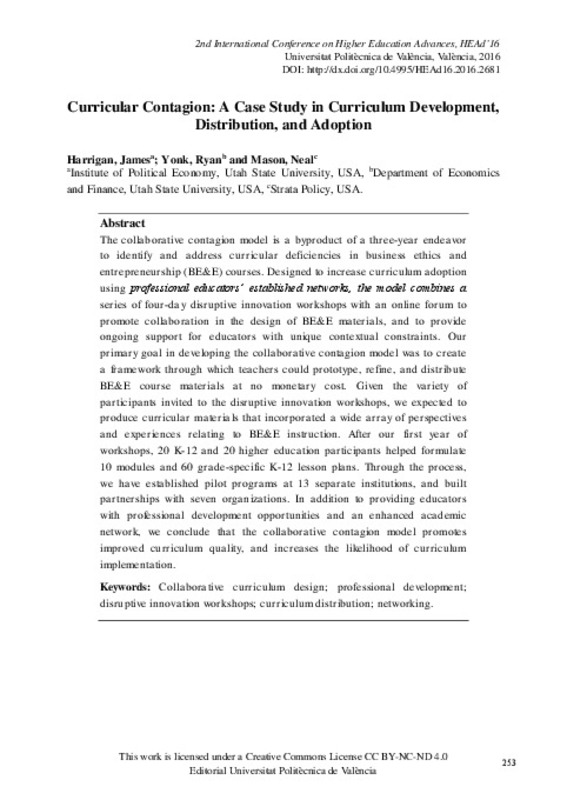JavaScript is disabled for your browser. Some features of this site may not work without it.
Buscar en RiuNet
Listar
Mi cuenta
Estadísticas
Ayuda RiuNet
Admin. UPV
Collaborative Contagion: A Case Study in Curriculum Development, Distribution, and Adoption
Mostrar el registro sencillo del ítem
Ficheros en el ítem
| dc.contributor.author | Harrigan, James
|
es_ES |
| dc.contributor.author | Yonk, Ryan
|
es_ES |
| dc.contributor.author | Mason, Neal
|
es_ES |
| dc.date.accessioned | 2017-11-14T10:52:14Z | |
| dc.date.available | 2017-11-14T10:52:14Z | |
| dc.date.issued | 2016-10-27 | |
| dc.identifier.isbn | 9788490484753 | |
| dc.identifier.uri | http://hdl.handle.net/10251/90988 | |
| dc.description.abstract | [EN] The collaborative contagion model is a byproduct of a three-year endeavor to identify and address curricular deficiencies in business ethics and entrepreneurship (BE&E) courses. Designed to increase curriculum adoption using professional educators’ established networks, the model combines a series of four-day disruptive innovation workshops with an online forum to promote collaboration in the design of BE&E materials, and to provide ongoing support for educators with unique contextual constraints. Our primary goal in developing the collaborative contagion model was to create a framework through which teachers could prototype, refine, and distribute BE&E course materials at no monetary cost. Given the variety of participants invited to the disruptive innovation workshops, we expected to produce curricular materials that incorporated a wide array of perspectives and experiences relating to BE&E instruction. After our first year of workshops, 20 K-12 and 20 higher education participants helped formulate 10 modules and 60 grade-specific K-12 lesson plans. Through the process, we have established pilot programs at 13 separate institutions, and built partnerships with seven organizations. In addition to providing educators with professional development opportunities and an enhanced academic network, we conclude that the collaborative contagion model promotes improved curriculum quality, and increases the likelihood of curriculum implementation. | es_ES |
| dc.format.extent | 8 | es_ES |
| dc.language | Inglés | es_ES |
| dc.publisher | Editorial Universitat Politècnica de València | es_ES |
| dc.relation.ispartof | 2nd. International conference on higher education advances (HEAD'16) | es_ES |
| dc.rights | Reconocimiento - No comercial - Sin obra derivada (by-nc-nd) | es_ES |
| dc.subject | Higher Education | es_ES |
| dc.subject | Learning | es_ES |
| dc.subject | Educational systems | es_ES |
| dc.subject | Teaching | es_ES |
| dc.subject | Collaborative curriculum design | es_ES |
| dc.subject | Professional development | es_ES |
| dc.subject | Disruptive innovation workshops | es_ES |
| dc.subject | Curriculum distribution | es_ES |
| dc.subject | Networking | es_ES |
| dc.title | Collaborative Contagion: A Case Study in Curriculum Development, Distribution, and Adoption | es_ES |
| dc.type | Capítulo de libro | es_ES |
| dc.type | Comunicación en congreso | es_ES |
| dc.identifier.doi | 10.4995/HEAD16.2015.2681 | |
| dc.rights.accessRights | Abierto | es_ES |
| dc.description.bibliographicCitation | Harrigan, J.; Yonk, R.; Mason, N. (2016). Collaborative Contagion: A Case Study in Curriculum Development, Distribution, and Adoption. En 2nd. International conference on higher education advances (HEAD'16). Editorial Universitat Politècnica de València. 253-260. https://doi.org/10.4995/HEAD16.2015.2681 | es_ES |
| dc.description.accrualMethod | OCS | es_ES |
| dc.relation.conferencename | Second International Conference on Higher Education Advances | es_ES |
| dc.relation.conferencedate | June 21-23,2016 | es_ES |
| dc.relation.conferenceplace | Valencia, Spain | es_ES |
| dc.relation.publisherversion | http://ocs.editorial.upv.es/index.php/HEAD/HEAD16/paper/view/2681 | es_ES |
| dc.description.upvformatpinicio | 253 | es_ES |
| dc.description.upvformatpfin | 260 | es_ES |
| dc.type.version | info:eu-repo/semantics/publishedVersion | es_ES |
| dc.relation.pasarela | OCS\2681 | es_ES |








